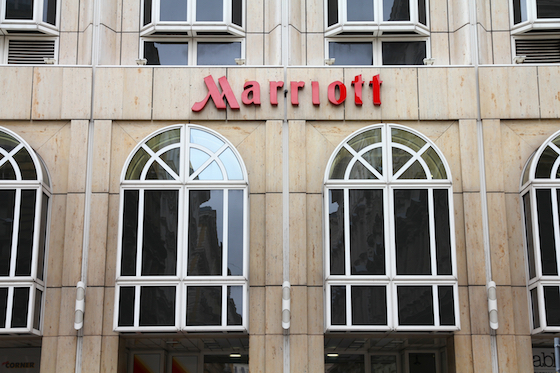Liquidity, supporting owners and mitigating associates’ pain in light of the hit from COVID-19 were among priorities for Marriott International discussed by executives during a conference call on Thursday.
“The markets are understandably looking for assurance that we will survive; there’s no other rational explanation for the selloff in our stock,” President and CEO Arne Sorensen said. With aggressive cost cutting and a healthy credit line, “we’re confident we will,” he added.
The call came a day after announcing a raft of cost-cutting measures: suspending salaries for Sorenson and Chairman J.W. Marriott Jr.; halving salaries of other senior executives through the end of 2020; requiring temporary leaves in North America, shortened work weeks and curtailment of non-essential travel and spending; and delay of at least a third of planned US$700 million to US$800 million in investments this year, among other items. Sorenson and Chief Financial Officer Oberg presented a case for how the company will weather the current storm.
Separately, in an emotional video to associates posted on Facebook, Sorenson said the impact of COVID-19 was worse than 9/11 and the 2009 global financial crisis combined, and said business was running 75% below normal levels in most regions. He cited recent signs of recovery in China as a bright spot on the horizon.

According to the conference call, the company also is working to dramatically reduce the expenses that depend on reimbursement from hotel owners to lift some of the burden on them, such as marketing.
“We spend US$1 billion a year on marketing; why would we be marketing when people are social distancing and not traveling?” Sorenson said.
Oberg painted a hypothetical scenario: If the company’s US$3.7 billion in EBITDA from 2019 were halved, then combined with reduced capex, interest and taxes, the company would still have US$800 million, in addition to US$1.5 billion in excess liquidity.
“That gives us US$2.3 billion to deal with maturities and working capital differences. So we have strong financial flexibility and a model that works really well,” Oberg said.
“We are working hard to prepare for any and all scenarios,” she added.
Sorenson said he is talking with senior leaders in Congress about two broad concerns: supporting furloughed employees to help them transition through the crisis, and helping owners with credit liquidity support.
“We are encouraged by (the government’s) constructive response and the speed at which these things are being considered,” he said.
Current state and outlook
In the U.S., Sorenson said, hotels that are located in drive-dependent areas that do more leisure trade are better positioned in the short term than urban properties heavily dependent on groups and air travel.
“I don’t think it will be rare” that many of the latter will close during the pandemic, he said. “I know there are hundreds of hotels closing or looking at closing.” Once the pandemic subsides, he added, those same group-oriented hotels are in established markets, which makes them “the most obvious no-brainers to reopen.”
In Asia, where the falloff in business has been staggering, Sorenson counted the fact that 75% of factories are running again and this week’s “no new cases” news from China’s epicenter of coronavirus as positive signs. He said occupancy rates in Macau, which had sunk to 2%, had already rebounded to 20%.
Sorenson also pointed out that dealmaking continues despite the crisis. Marriott is on the verge of signing a 13-hotel package in Asia.
“Net-net, I will say we’ll open fewer hotels in 2020 than anticipated, and sign fewer than anticipated, but I don’t think those will turn off entirely because rational economic behavior will be to move forward,” he noted.
Sorenson acknowledged that the aggressive cost-cutting measures may hinder Marriott’s ability to rebound. If that’s the case, he added, that’s good news — it will mean recovery is proceeding faster and stronger than expected.
“That’s a challenge we’ll face when we get there,” he said. “We’ll enjoy figuring out” how to ramp back up.
